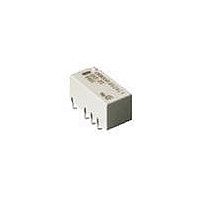G6SK-2F-DC24 Omron, G6SK-2F-DC24 Datasheet - Page 9

G6SK-2F-DC24
Manufacturer Part Number
G6SK-2F-DC24
Description
Low Signal Relays - PCB DPDT 24VDC G leads Dual coil latching
Manufacturer
Omron
Series
G6Sr
Specifications of G6SK-2F-DC24
Coil Type
Dual Latching
Coil Current
12.5 mA
Contact Form
2 Form C
Coil Voltage
24 VDC
Power Consumption
300 mW
Termination Style
Solder Pad
Contact Rating
0.5 A at 125 VAC, 2 A at 30 VDC
Contact Configuration
DPDT
Contact Current Max
2A
Contact Voltage Ac Nom
125V
Contact Voltage Dc Nom
30V
Coil Voltage Vdc Nom
24V
Coil Resistance
1920ohm
Lead Free Status / RoHS Status
Lead free / RoHS Compliant
Lead Free Status / RoHS Status
Lead free / RoHS Compliant, Lead free / RoHS Compliant
Other names
24DC G6SK-2F
Available stocks
Company
Part Number
Manufacturer
Quantity
Price
Company:
Part Number:
G6SK-2F-DC24V
Manufacturer:
OMRON
Quantity:
12 000
G6S
■
When ordering, add “-TR” before the rated coil voltage for tape packing.
Tape type:
Reel type:
Relays per reel: 400
Precautions
Use a DC power supply with 5% or less ripple factor to operate
the coil.
Do not use the G6S where subject to strong external magnetic
fields.
Do not use the G6S where subject to magnetic particles or exces-
sive amounts of dust.
Do not reverse the polarity of the coil (+, −).
Latching types are delivered in the reset position. We recommend
that a reset voltage be applied in advance to start operation.
Do not drop the G6S or otherwise subject it to excessive shock.
Remove the relay from the packing immediately prior to usage.
■
Long-term Continuously ON Contacts
Using the Relay in a circuit where the Relay will be ON continu-
ously for long periods (without switching) can lead to unstable
contacts because the heat generated by the coil itself will affect
the insulation, causing a film to develop on the contact surfaces.
We recommend using a latching relay (magnetic-holding relay) in
this kind of circuit. If a single-side stable model must be used in
this kind of circuit, we recommend using a fail-safe circuit design
that provides protection against contact failure or coil burnout.
Relay Handling
Use the Relay as soon as possible after opening the moisture-
proof package. If the Relay is left for a long time after opening the
moisture-proof package, the appearance may suffer and seal fail-
ure may occur after the solder mounting process. To store the
Relay after opening the moisture-proof package, place it into the
original package and sealed the package with adhesive tape.
2±10.5
Tape Packing
Precautions
R1.0
13±0.2
2±0.3
Carrier tape
TE2416R (Refer to EIAJ)
R24E (Refer to EIAJ)
Orientation mark
Cover tape
Emboss tape
Feed direction
29.5±1.0
80
25.5±0.5
330
G6S-2F, G6SU-2F, G6SK-2F, G6S-2F-Y
G6S-2G, G6SU-2G, G6SK-2G, G6S-2G-Y
When washing the product after soldering the Relay to a PCB,
use a water-based solvent or alcohol-based solvent, and keep the
solvent temperature to less than 40°C. Do not put the Relay in a
cold cleaning bath immediately after soldering.
G6S (K) (-U) -2 Soldering
• Soldering temperature: Approx. 250°C (At 260°C if the DWS
• Soldering time: Approx. 5 s max. (Approx. 2 s for the first time
• Be sure to adjust the level of the molten solder so that the solder
Claw Securing Force During Automatic Mounting
During automatic insertion of Relays, be sure to set the securing
force of each claw to the following so that the Relay’s characteris-
tics will be maintained.
Dimension A: 1.96 N max.
Dimension B: 4.90 N max.
Dimension C: 1.96 N max.
A
method is used.)
and approx. 3 s for the second time if the DWS method is used.)
will not overflow onto the PCB.
C
B
G6S
9















